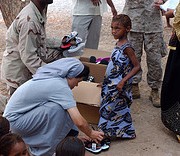
International (MNN) — Today we touch on the negative aspects of the Western world's short-term missions in part three of our series.
One subtle issue that short-term mission teams run into are the members' motivation for going. Are we going on mission trips simply for vacation? "Some actually even call them that: 'vacations with a purpose.' I guess my concern is if that is your very motivation on the front end – to have a vacation but be a little more purposeful about it, well I'm not sure we can really call that 'missions.' I would say ‘Hey, for all of us as believers, go on vacation and, as you do, be conscious of mission. But don't ask me to fund your vacation that's purposeful,'" said David Livermore, author of Serving with Eyes Wide-Open: Doing Short-Term Missions with Cultural Intelligence.
Many stories float around about the life-changing experience of short-term missions. While this is not all bad, a life-changing experience should not be the motivation for going
on a trip. "When in the history of the church has a missionary come raising support and saying, ‘You need to support me so my life can be changed?'
We wouldn't have considered doing that. I am concerned about exploiting other people just so we can have a nice, life-changing experience," said Livermore.
These days, youth groups practically replace summer camp with short-term mission trips, and perhaps even have a plan for doing so. "There's kind of this idea: in middle school you do something domestic; when you're a freshman or sophomore, you go to Mexico; and, man, by the time you're a junior or senior, you'd better do something really big like Africa or Asia. That concerns me when we feel like we have to keep one-upping it," said Livermore.
With trips around two weeks long, it is difficult to get an accurate feel for the culture and the local people. For years, organizations and missionaries have spent months-to-years trying to understand a culture, while short-termers may spend just six weeks preparing. "The challenge is, when we go into a new culture, we immediately look for things
that we have in common with them," said Livermore. Though that trait brings us together as humans, it doesn't allow us to see the subtle differences in a culture.
"Ralph Winter, who's a known expert in missions for a number of years, has often said that short-term missionaries are like dogs in an art museum: they run through and see everything but appreciate nothing," said Livermore. We think that seeing everything has given us a true experience of a culture.
Some of those differences are sociological and can't be seen in a matter of two weeks. Many who've traveled to third world countries respond that the people there had so little but were still so happy. "Were they happy? What do you do when you can't
communicate with somebody that doesn't speak the same language as you? Often there's a lot of smiling, nervous laughter, nodding our head back and forth; it doesn't necessarily mean you're happy. It might just be a nervous non-verbal response," said Livermore.
Another example is a group of pastors who seemed to listen intently to an American pastor's teaching. While the American thought they were hungry for knowledge, even in the heat of the day, the international pastors had other feedback. "What they need to realize, however, is that in our culture we'd never think of getting up in the middle of a guest
lecturer's presentation or interrupting them even if it had nothing to do with our lives. We'd sit there and be kind and nod our heads," said Livermore. Non-verbals don't always mean what we think they do.
Often our task-oriented, efficient Western mind can hinder more than help on short-term missions. For example, if a team gets a heart for a certain family and purchases shoes for all of them, it can radically and subtly affect the family. "Now, that whole family has been ostracized from the rest of the village because not everyone got shoes. Or what happens
when those shoes wear out, and now the kids' feet aren't hardened in the way that they were before," said Livermore. We have to keep an eye on the big picture in these kinds of situations.
Finally, we must ask ourselves if we are doing missions in our own neighborhood before we take a trek somewhere else.
Tune in tomorrow for the last of our series on short-term missions.